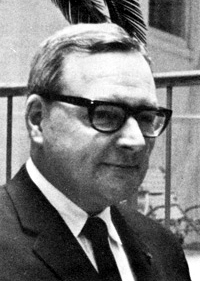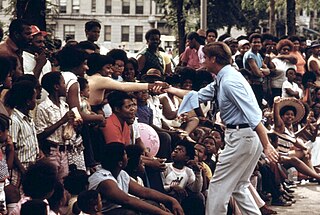
The 1978 United States Senate elections in the middle of Democratic President Jimmy Carter's term. Thirteen seats changed hands between parties. The Democrats at first lost a net of two seats to the Republicans, and then one more in a special election. Democrats nevertheless retained a 58-41 majority.

The 1972 United States Senate elections coincided with the landslide re-election of Republican President Richard Nixon. Despite Nixon's victory, Democrats increased their majority by two seats. After the elections, Democrats held 56 seats and Republicans held 42 seats, with 1 Conservative and 1 independent Senator. These were the first elections in which all citizens at least 18 years of age could vote due to the 1971 passage of the 26th Amendment.
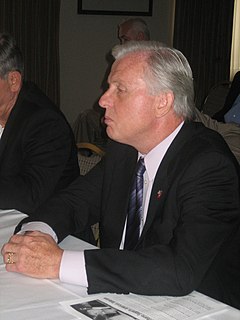
Jack E. Wagner is a Democratic politician from Pennsylvania. He is a former State Auditor General, and has also served in the State Senate and Pittsburgh City Council.

The North Carolina United States Senate election of 1968 was held on 5 November 1968 as part of the nationwide elections to the Senate. The general election was fought between the Democratic incumbent Sam Ervin and the Republican nominee Robert Somers. Ervin won re-election to a third full term, with over 60% of the vote.

The 1974 Massachusetts gubernatorial election was held on November 5, 1974. Michael Dukakis was elected to a four-year term, from January 4, 1975 until January 4, 1979. He defeated incumbent Governor of Massachusetts Francis W. Sargent in the general election.

The 1970 Massachusetts gubernatorial election was held on November 3, 1970. Acting Governor Francis W. Sargent was elected to a four-year term. He defeated incumbent Boston Mayor Kevin H. White in the general election.

The 1964 Massachusetts gubernatorial election was held on November 3, 1964. Former Governor John A. Volpe was elected to a two-year term. He defeated former Lieutenant Governor Francis X. Bellotti in the general election.

A Massachusetts general election was held on November 3, 1998 in the Commonwealth of Massachusetts.

The North Carolina gubernatorial election of 1984 was held on November 6, 1984. Popular Democratic incumbent Jim Hunt was unable to run for another consecutive term under the North Carolina Constitution. Hunt ran instead for the U.S. Senate against Jesse Helms and lost. Popular 9th District Congressman James G. Martin ran as the Republican nominee against Democratic Attorney General Rufus L. Edmisten, who defeated Hunt's Lt. Governor, James Green, among other candidates, in a hotly contested primary.

The North Carolina gubernatorial election of 1980 was held on November 4, 1980. Despite North Carolina going to Ronald Reagan in the presidential race and the U.S. Senate race being won by a Republican, popular Democratic Governor Jim Hunt won a second term in office in a landslide over I. Beverly Lake. Hunt thus became the first governor of the state elected to a consecutive four-year term, following an amendment to the North Carolina Constitution allowing such a run.

The 2002 United States House of Representatives special election in Oklahoma's 1st congressional district was held on January 8, 2002 to select the successor to Steve Largent (R) who resigned to focus on his campaign for Governor of Oklahoma. Both of the major parties held primaries to determine their nominees. The Republican primary featured a competitive contest between then-First Lady of Oklahoma Cathy Keating, and state Senator Scott Pruitt, and the eventual winner state Representative John Sullivan. Sullivan subsequently defeated Tulsa School Board present Doug Dodd by a ten point margin.

The Louisiana gubernatorial election of 1916 was held on April 18, 1916. Like most Southern states between the Reconstruction Era and the Civil Rights Movement, Louisiana's Republican Party was virtually nonexistent in terms of electoral support. This meant that the Democratic Party primary held on January 25 was supposed to be the real contest over who would be governor. However, in this particular election Progressive Party nominee John M. Parker ran an unusually competitive campaign, garnering 37% of the general election vote. The election resulted in the election of Democrat Ruffin G. Pleasant as governor of Louisiana.
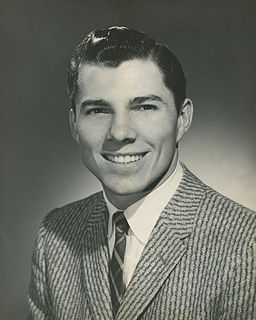
The 1974 Georgia gubernatorial election was held on November 5, 1974. Under Georgia's constitution at the time, incumbent Democratic governor Jimmy Carter was ineligible to serve a second consecutive term. He was elected President of the United States in the 1976 presidential election. George Busbee was elected as the 77th Governor of Georgia.

The 1936 Arizona gubernatorial election took place on November 3, 1936. Incumbent Governor Benjamin Baker Moeur ran for reelection, but he was defeated in the Democratic primary by former judge of the Maricopa County Superior Court Rawghlie Clement Stanford.

The 1944 Arizona gubernatorial election took place on November 7, 1944. Incumbent Governor Sidney Preston Osborn ran for reelection, and easily won the Democratic primary, with only token opposition as former Governor Robert Taylor Jones declined to challenge Osborn to a rematch following two losses, in 1940 and 1942.
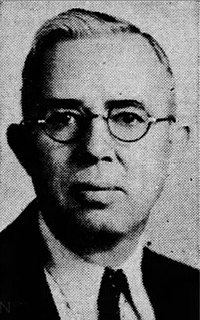
The 1948 Arizona gubernatorial election took place on November 2, 1948. Following the death of Governor Sidney Preston Osborn while in office, Dan Edward Garvey, who was serving as Secretary of State of Arizona was ascended to the position of governor, and thus ran for a full term. Facing a crowded primary field, Garvey emerged successful as the Democratic party's nominee.

The 1954 Arizona gubernatorial election took place on November 2, 1954. Incumbent Governor John Howard Pyle, the first Republican elected to the office in two decades, ran for reelection for a third term.

The 1964 Arizona gubernatorial election took place on November 3, 1964. Incumbent Governor Paul Fannin decided not to run for reelection to a fourth term as governor, instead deciding to successfully run for the United States Senate when incumbent U.S. Senator Barry Goldwater decided to run for President of the United States.

The Illinois gubernatorial election of 1968 was held in Illinois on November 5, 1968. The Democratic nominee, incumbent Governor Samuel H. Shapiro, lost reelection to the Republican candidate, Richard B. Ogilvie.
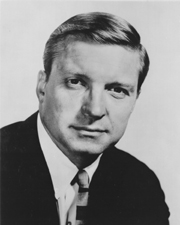
The Illinois gubernatorial election of 1964 was held in Illinois on November 3, 1964. The Democratic nominee, incumbent Governor Otto Kerner, Jr., won reelection against the Republican candidate, Charles H. Percy.

